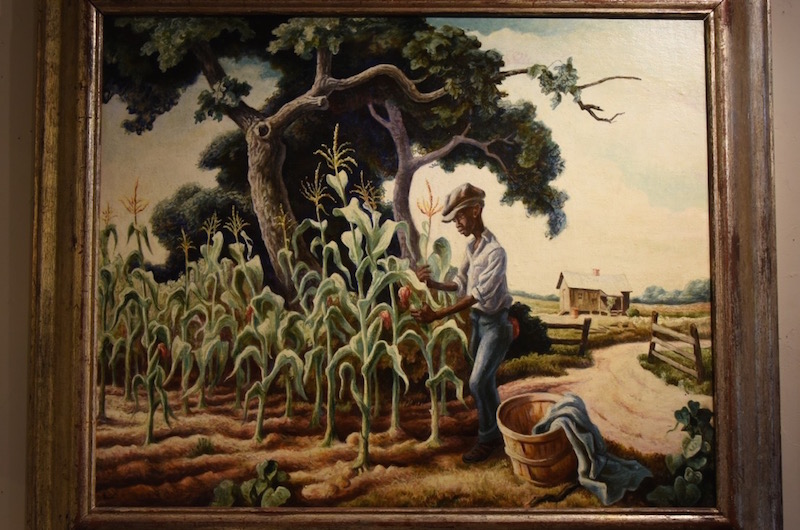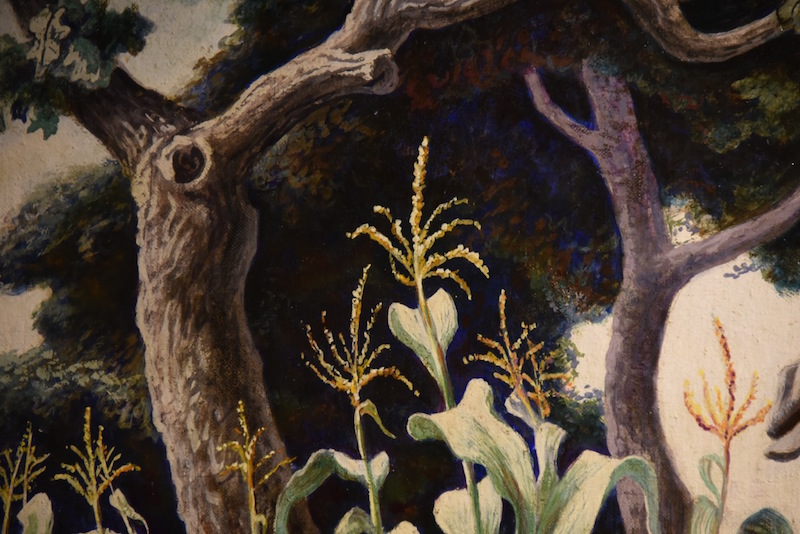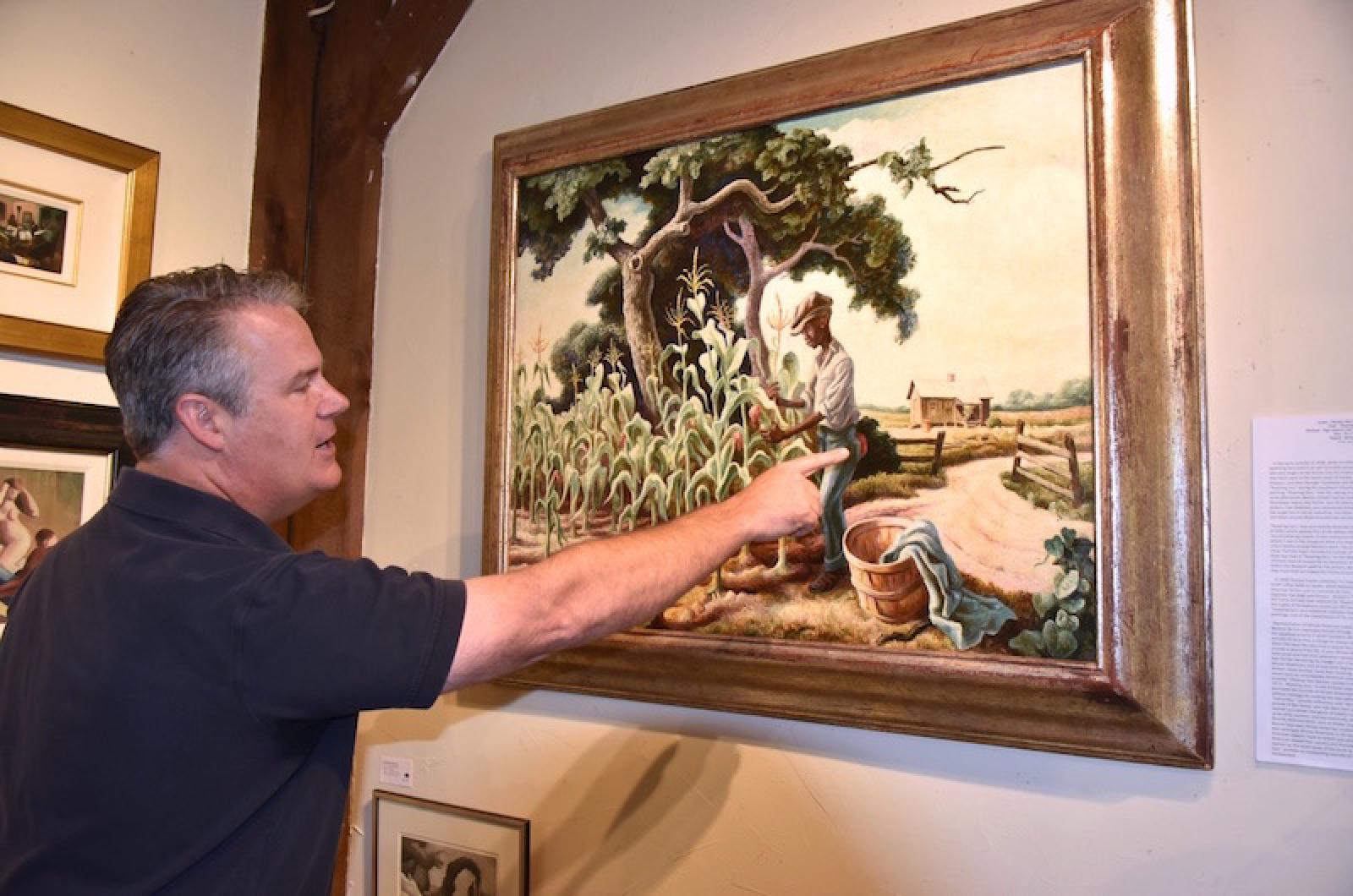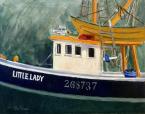The Thomas Hart Benton painting Roasting Ears holds an important place in American art history, and now it holds a place on the walls of the Granary Gallery in West Tisbury.

It is a deceptively simple composition. A young African-American man picks a red tasseled ear of corn from a tall green stalk, with a gnarled old tree in the background, and further back sits a small cabin. It is a seminal example of American Regionalism, a style popularized by Mr. Benton and others over a lifetime of painting. He found beauty in the ordinary labor of ordinary people, caring nothing for the European sensibilities that dominated much of the art world at the time.
Mr. Benton sold Roasting Ears directly to the Metropolitan Museum of Art in New York city, where it hung for more than five decades. The artist earned $3,000 for the painting when he sold it in 1939.
Now it is worth millions, but gallery owner Chris Morse, who owns a small percentage of the work in partnership with two other collectors, is far more enthusiastic abut the importance of the piece than he is about its sale value.
“The importance of that painting in American art history is pretty remarkable,” Mr. Morse said. “It represents a time in America that was not without its challenges. Benton portrayed that time with an elegance and a humility, remarkable compassion. The fact that the Metropolitan Museum of Art chose to buy this painting from Tom Benton in 1939 is an enormous endorsement of the quality and importance of the painting.”
The Metropolitan Museum sold the painting to raise funds in 1990. It passed through the hands of several private collectors since then. Mr. Morse and his partners acquired it earlier this summer and it is for sale again. Until a buyer comes along, it will hang at the Granary Gallery for all to see.
Mr. Benton first summered on the Island in 1920, as a struggling artist just back from studying in Paris. It was a melancholy time for him, but he fell in love with the rural landsapes and contemplative pace up-Island, and returned every summer for 50 years. In his autobiography, he credited the Vineyard with giving him the perspective to refine his style.
“It was on Martha’s Vineyard that I really began to mature my painting — to get a grip on my emerging style and way of doing things,” he wrote. “I painted the landscape there and the old people. About the old Yankees on the Island there was something deeply appealing. Many of them, for all their crotchety ways, had the nobility of medieval saints. They were not, however, all noble. Some of them were more picturesque than saintly, but I painted them just the same.
“I made pictures of Billy Benson, Frank Flanders, Chester Poole, Dan Vincent. Old George West and his wife hang now in the Whitney Museum. Painting these plain American people and their environment, I got clear of all the hangovers of France and the isms of modern aesthetics. Looking over the sea, I got rid of most of my upsurging cockiness, too.”
Successful with a paintbrush, Mr. Benton was also quite accomplished with a pen. An essay published in the Vineyard Gazette in 1946 was a tribute to his dog Jake. He described a time when his wife Rita and son T.P. cut their Vineyard summer short for an international voyage.
“This was a sad time for Jake. Up to now he’d given me little attention. Rita fed him and T.P. played with him. Of what use I might be he had little use to consider, I was just there, good enough to shake hands with occasionally but not important. Now, however, he clung to me, and I took him on a long roundabout tour of the South, which ended after seven weeks in New York where we met the boat returning his real master and mistress.”
At a stop in Missouri in 1938, during that long roundabout tour of the South, Mr. Benton paused at a cornfield, and made the sketch that would eventually become Roasting Ears.
Jane Slater of Chilmark got to know Mr. Benton as a child. Her family rented a barn to Mr. Benton during his first summers on the Island, and later sold him a camp overlooking Menemsha Pond, where he lived and worked many more summers. He was, by then, a popular figure in the art world.
“When he got to be established, he had many guests come, Jackson Pollock came,” Ms. Slater said. “That summer was a very busy summer for visiting artists because they all wanted to study with Tom at that point. One night, Rita called up and said that we had to come up with a bed for (artist) Robert Motherwell, so my mother took me out of my bed. That’s the way the community accepted Benton and his family. They always accommodated them. Rita would go around to the farmers and get vegetables and milk and fish and occasionally a bed for a guest.”
Mr. Benton’s grandson Anthony Benton Gude, also a painter, lives in West Tisbury. He has fond memories of visiting his grandfather’s studio in Menemsha.

“I was always impressed even at an early age, with his work ethic,” Mr. Gude said. “He was getting into his eighties when I knew him. He was always up at his studio by the time I woke up, and I was a little kid, I got up early.”
Mr. Gude, speaking by phone from Kansas where he was preparing for an art show, said his own painting style is different than that of Mr. Benton, but people have noticed a connection.
“There are some similarities that have been pointed out to me over the years,” he said. “I think his sense of composition rubbed off on me, in being around him. Things just look right when I see it in a similar context.”
For Mr. Morse, Roasting Ears is one of only a handful of paintings that have inspired awe in the many people making special trips to see it, and it is one of the highlights of his nearly 30 years running the Granary Gallery.
“No one can believe that painting is in West Tisbury,” he said. “It was in the Metropolitan for 52 years, now it’s in the Granary Gallery in West Tisbury which is very exciting for us. As a Benton fan, it is the pinnacle.”
The Granary Gallery is located at 636 Old County Road in West Tisbury. On Sunday, August 27 from 5 to 7 p.m. there will be a gallery reception for the photography of Vivian Maier.








Comments (1)
Comments
Comment policy »